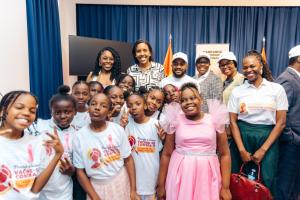For Them, For the Future: A Call for Collective Action
This opinion piece was first published in Jornal de Angola, a copy of which can be found here: https://www.jornaldeangola.ao/noticias/9/opini%C3%A3o/650149/por-elas-pelo-futuro:--um-apelo-%C3%A0-ac%C3%A7%C3%A3o-colectiva
By Olívio Gambo, WHO Angola Communication Officer
Women are the beating heart of any nation. They represent the present, continuity, and hope for a healthy and prosperous future. Protecting women means protecting society. Regarding public health, this protection begins early, with girls, through a simple but powerful gesture: vaccination.
In this regard, the Government of Angola, with the support of its partners in the health sector, has taken a decisive step by launching the National Campaign for Community Mobilisation and Involvement in Vaccination against Cervical Cancer. The objective is clear: to raise awareness of the importance of vaccinating girls aged between 9 and 12 years old, through the administration of a dose of the CECOLIN vaccine, which is safe, effective, and certified by the World Health Organisation (WHO).
More than a public health initiative, this campaign calls for national awareness, intergenerational solidarity, and the mobilisation of all sectors of society to protect Angolan girls and future generations. Cervical cancer is one of the most preventable diseases, but it continues to cause silent deaths. According to the WHO, in 2022, around 660,000 women were diagnosed with the disease, of whom 350,000 died worldwide, 94% of them in low- and middle-income countries.
In Africa, around 117,000 cases are recorded annually, of which 76,000 are fatal. Angola is no stranger to this reality. Based on the average incidence and fatality rate, WHO estimates point to more than 2,000 new cases per year, of which more than half are fatal. However, we know that many cases go undiagnosed due to a lack of screening, information, and access to health services.
What do these figures mean for us Angolans? They mean broken families, weakened communities, and an emotional and financial burden that is difficult to bear. The struggle of a mother, sister, aunt, cousin, grandmother, mother-in-law, or daughter against this disease is a pain that spans generations. Transport, tests, medicines, and special care costs can jeopardise family livelihoods and exacerbate existing inequalities.
However, there is hope. International experience shows that community mobilisation is key to success. Countries such as Nigeria, Senegal, and Tanzania have achieved vaccination coverage rates of over 80% by involving religious leaders, schools, youth organisations, and community structures. In Senegal, vaccination has become part of the school routine, and in Nigeria, the ‘One Dose at a Time’ campaign has mobilised millions of girls through door-to-door actions.
Angola can also make history. To do so, the awareness and registration phase, which precedes the vaccination scheduled for 27 October, must be experienced as a moment of national unity. It must involve families, schools, churches, community leaders, journalists, influencers, artists, and politicians. No girl can be left behind.
Communication about vaccination must be clear, accessible, and culturally relevant. We must use all the means and channels at our disposal: markets, local radio stations, television, newspapers, social media, churches, and any other community or conventional communication channels to ensure that the message reaches and is understood by everyone. Every girl vaccinated represents a victory for citizenship. Every community involved represents a step towards strengthening health and social justice access.
Strategic communication, essential to the campaign’s success, is not limited to conveying a message. It is necessary to build bridges, raise awareness, and touch hearts. This campaign requires more than technical data: it requires emotion, empathy, and emotional involvement. Therefore, we are all invited to communicate with purpose, to ensure that all girls are vaccinated, and that cervical cancer is no longer a death sentence, but rather a page turned in the history of Angolan public health.
May every journalist, teacher, artist, influencer, politician, community leader, priest, pastor, young person, mother, and father become an agent of change! May every neighbourhood become a centre of hope, where the vaccination of every girl is celebrated as a symbol of progress and active citizenship.
Because vaccinating is caring, mobilising is protecting, and involving the community is inspiring change. Join this mobilisation for them and for the future!
